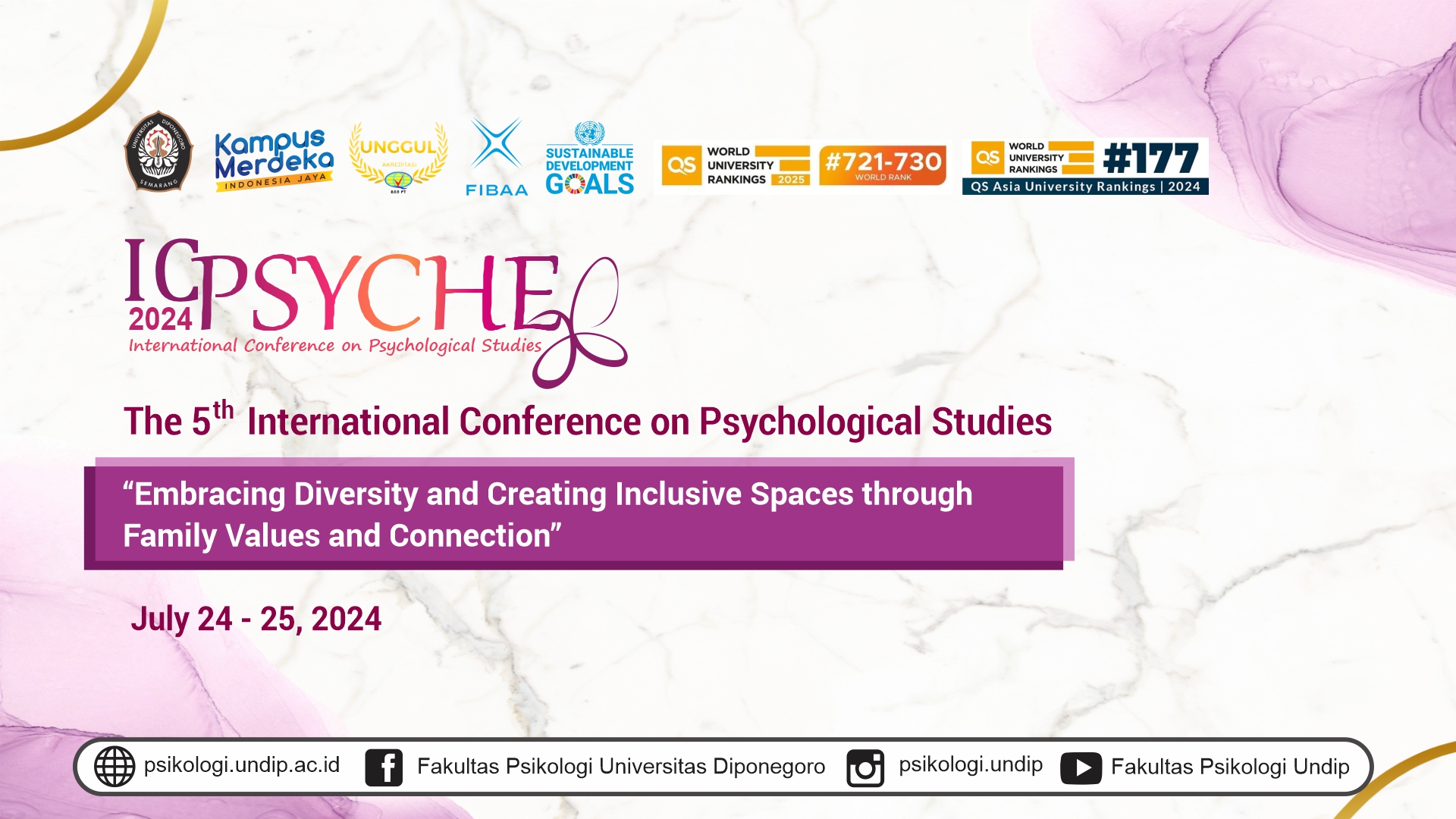In mid-2024, the Faculty of Psychology at Diponegoro University (UNDIP) once again hosted the fifth international webinar series titled The 5th International Conference on Psychological Studies (ICPSYCHE). ICPSYCHE 2024 was a forum for webinars and discussions on the theme “Embracing Diversity and Creating Inclusive Spaces through Family Values and Connection,” held virtually via Zoom meeting on July 24-25, 2024.
The Faculty of Psychology UNDIP invited psychology experts as speakers for ICPSYCHE 2024, including keynote speaker Prof. Dr. Roziah Binti Mohd Rasdi, a lecturer at the Faculty of Educational Studies, Universiti Putra Malaysia. The four plenary session speakers included Dr. Prasetyo Budi Widodo, S.Psi., M.Si., a lecturer at the Faculty of Psychology, Diponegoro University, Indonesia; Prof. Anubhuti Dubey, Professor of Psychology and Dean of Student Welfare, Dean Dayal Upadhyay Gorakhpur University, India; Prof. Missy Morton, Professor of Critical Studies in Education and Associate Dean for Equity and Diversity at the Faculty of Education Administration, University of Auckland, New Zealand; and Dr. Mirko Duradoni, a lecturer at the Department of Education, Languages, Interculture, Literatures and Psychology, University of Florence, Italy.
UNDIP Rector, Prof. Dr. Suharnomo, S.E., M.Si., officially opened the event. He expressed that this international webinar represented UNDIP’s commitment to enhancing the quality of its academic institution towards becoming a World-Class University. “Inequality is an issue everywhere, from within families to workplaces and so on. It is time for us to take the initiative to support justice. Let’s embrace diversity,” said Prof. Suharnomo.
The Dean of the Faculty of Psychology UNDIP, Prof. Dian Ratna Sawitri, S.Psi., M.Si., Ph.D., emphasized in her speech the importance of maintaining community relationships and creating inclusive spaces where everyone is accepted for their differences. “As we nurture relationships in the community, we can seek common ground and celebrate differences,” she explained, supporting the continuation of this discussion forum as a platform for gathering perspectives from various communities.
Keynote speaker Prof. Dr. Roziah Binti Mohd Rasdi presented material on “Embracing Diversity and Creating Inclusive Spaces through Family Values and Connections.” Understanding diversity is a concrete action in forming inclusive spaces where everyone is valued. “Focus on goodness and engage in interaction. Forming inclusivity begins with self-awareness and starts within the family, friends, and community. Inclusive spaces in communities can reduce ethnocentrism, for example, through this Summer Course event,” explained Prof. Dr. Roziah.
Dr. Prasetyo Budi Widodo, S.Psi., M.Si., presented on “Indonesian Family Values: Promoting or Hindering Corruption?” Corruption in Indonesia occurs in various fields of work. Corruption culture can take root in families if they share the same values and beliefs. Therefore, when under financial pressure, a person must be able to justify that corruption is wrong and refrain from it even when the opportunity arises.
Prof. Anubhuti Dubey discussed “Promotion of Well-being with Inclusive Development of Children and Adolescents with Health Needs with Special Reference to India and Indian Knowledge Systems.” According to her, inclusive spaces can support adolescents’ health, including both physical and mental health. Unstable mental conditions can worsen physical health and, in severe cases, lead to suicide. Case studies are conducted to find ways to create a healthy community culture and instill values of kindness, especially in adolescents.
Prof. Missy Morton opened a discussion on “Promoting Inclusion and A Sense of Belonging for Families of Disabled Children.” Family support is crucial for the growth of children with disabilities, implementing a sense of belonging so that the children feel accepted and not treated differently.
Meanwhile, Dr. Mirko Duradoni presented “From Phubbing to Inclusion Within the Family: The Case of Parental Phubbing.” Families can break the chain of phubbing (ignoring those around them by focusing on their phones) by increasing interactions among family members, discussing positive things, and not focusing on the negative. Families also play a crucial role in reducing the occurrence of childhood trauma that can impact a person’s tendency to isolate themselves. (Titis – Public Relations)










